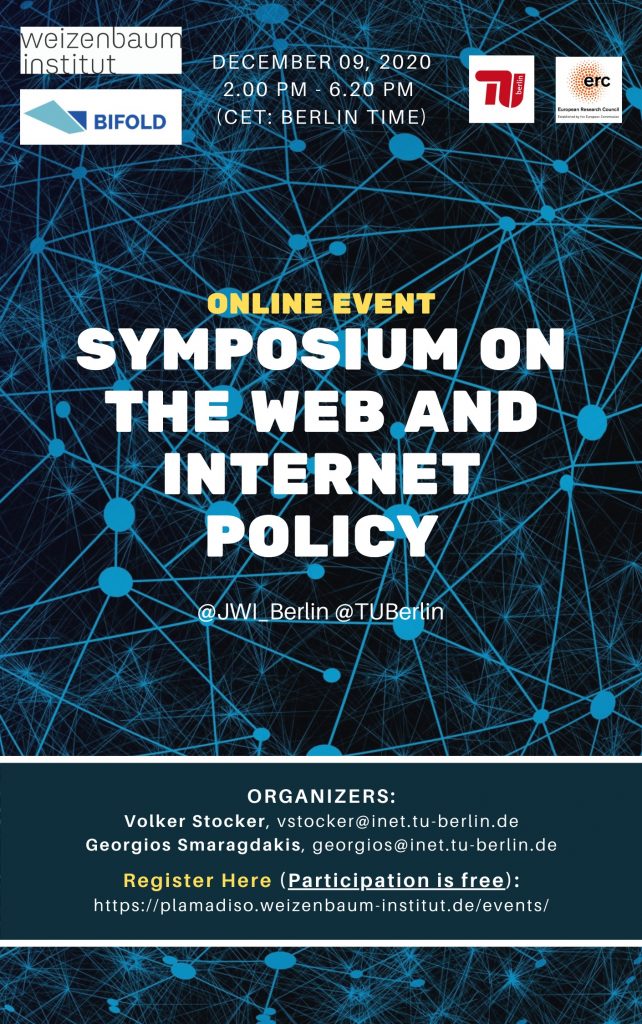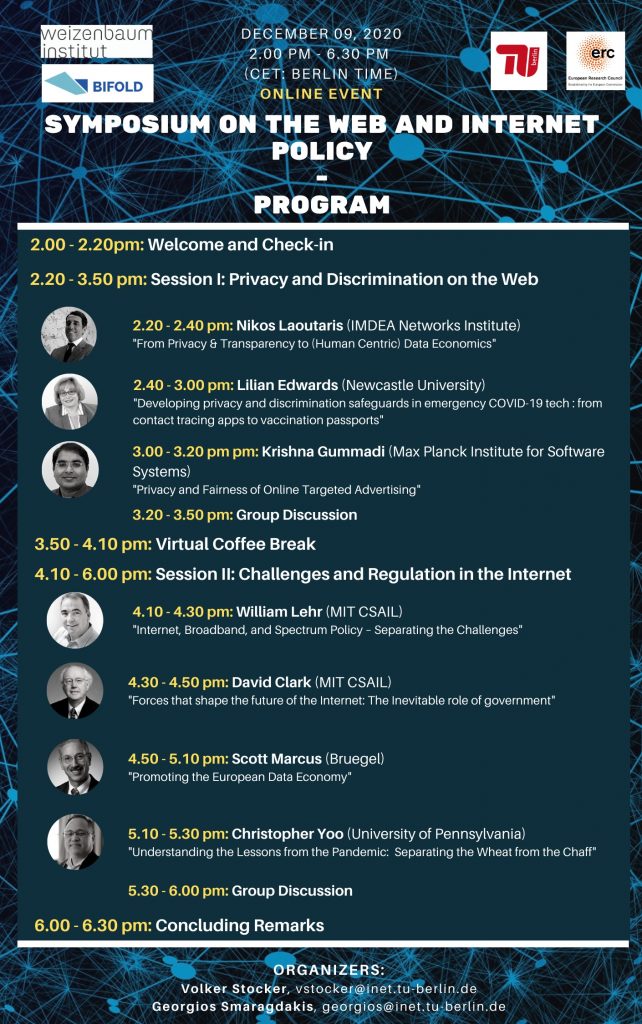Contents
Jan Krämer (University of Passau): “Data Portability in Digital Markets: Economic Implications and Policy Recommendations” [09/07] – https://youtu.be/wgBMpnx99wg
Leilani H. Gilpin (MIT): “Explaining Explanations in AI” [29/10]
Georgios Smaragdakis (TU Berlin, MPI for Informatics): “The Lockdown Effect: Implications of the COVID-19 Pandemic on the Internet Traffic” [25/11] – https://youtu.be/-HkrbNfJYq0
Edward Oughton (George Mason University, Oxford University): “Policy choices can help keep universal broadband targets affordable: A spatial model of 4G and 5G rollout in developing countries” [03/12] – https://youtu.be/Hofyw0fr8E0
Volker Stocker (TU Berlin) and Georgios Smaragdakis (TU Berlin, MPI for Informatics): “Symposium on the Web and Internet Policy” [09/12] – https://plamadiso.weizenbaum-institut.de/web-internet-policy-symposium/


Symposium on the Web and Internet Policy
In case you have questions, please do not hesitate to contact us:
Dr. Volker Stocker
(vstocker@inet.tu-berlin.de)
Prof. Georgios Smaragdakis (georgios.smaragdakis@tu-berlin.de)

The Speakers
Lilian Edwards (Newcastle University)
Nikos Laoutaris (IMDEA Networks)
Krishna Gummadi (Max Planck Institute for Software Systems)
William Lehr (MIT)
David D. Clark (MIT)
Scott Marcus (Bruegel)
Christopher Yoo (U Penn)


"Policy choices can help keep universal broadband targets affordable: A spatial model of 4G and 5G rollout in developing countries"
Abstract: In recognition of the transformative opportunities that broadband connectivity presents, the United Nations Broadband Commission has committed the international community to accelerate universal access across the developing world. However, the cost of meeting this objective, and the feasibility of doing so on a commercially viable basis, are not well understood. This paper compares the global cost-effectiveness of different infrastructure strategies for the developing world to achieve universal 4G or 5G mobile broadband. Utilizing remote sensing and geospatial infrastructure simulation, least-cost network designs are developed for eight representative low and middle-income countries (Malawi, Uganda, Kenya, Senegal, Pakistan, Albania, Peru and Mexico), the results from which form the basis for aggregation to the global level. To provide at least 2 Mbps per user, 4G is often the cheapest option, whereas a minimum 10 Mbps per user is cheapest with 5G non-standalone (NSA). The cost of meeting the UN Broadband Commission target of a minimum 10 Mbps per user is estimated at $1.4 trillion using 5G NSA, equating to approximately 0.5% of annual GDP for the developing world over the next decade. However, by creating a favorable regulatory environment governments can bring down these costs by as much as three quarters – to $0.5 trillion (approximately 0.2% of annual GDP) – and avoid the need for public subsidy. Providing governments make judicious technology choices, while adopting fiscal and regulatory regimes conducive to lowering costs, broadband universal service may be within reach of most developing countries over the next decade.
Edward Oughton (https://science.gmu.edu/directory/edw…) is known for developing decision-support models of digital infrastructure, having carried out 5G assessments for countries around the world. His work provides evidence on effective strategies to connect more people to a faster internet. Such information is vital for ensuring sustainable economic development as most new technologies require internet connectivity. The open-source 5G assessment software he has developed has been used to support national and international policy decisions.

"The Lockdown Effect: Implications of the COVID-19 Pandemic on the Internet Traffic”
Georgios Smaragdakis is a Professor with Technical University (TU) Berlin, heading the Chair of Internet Measurement and Analysis. He is also a research affiliate with Max Planck Institute for Informatics and a research collaborator with Akamai Technologies.
In the talk, he will present a recently published paper that appeared at ACM Internet Measurement Conference (https://conferences.sigcomm.org/imc/2020/) in which the authors examine the effect of the lockdowns on traffic shifts, by collecting and analyzing network data from a diverse set of vantage points (one ISP, three IXPs, and one metropolitan educational network).
Abstract of the corresponding paper: Due to the COVID-19 pandemic, many governments imposed lock- downs that forced hundreds of millions of citizens to stay at home. The implementation of confinement measures increased Internet traffic demands of residential users, in particular, for remote working, entertainment, commerce, and education, which, as a result, caused traffic shifts in the Internet core. In this paper, using data from a diverse set of vantage points (one ISP, three IXPs, and one metropolitan educational network), we examine the effect of these lockdowns on traffic shifts. We find that the traffic volume increased by 15-20% almost within a week while overall still modest, this constitutes a large increase within this short time period. However, despite this surge, we observe that the Internet infrastructure is able to handle the new volume, as most traffic shifts occur outside of traditional peak hours. When looking directly at the traffic sources, it turns out that, while hypergiants still contribute a significant fraction of traffic, we see (1) a higher increase in traffic of non-hypergiants, and (2) traffic increases in applications that people use when at home, such as Web conferenc- ing, VPN, and gaming. While many networks see increased traffic demands, in particular, those providing services to residential users, academic networks experience major overall decreases. Yet, in these networks, we can observe substantial increases when considering applications associated to remote working and lecturing.

"Communication behaviour in Germany"
Serpil Taş is a Senior Economist at the Wissenschaftliches Institut für Infrastruktur und Kommunikationsdienste (WIK). For more information about her research focus please visit her website at the WIK:
https://www.wik.org/en/wik/who-is-who/ta

"Explaining Explanations in AI"
Leilani H. Gilpin is a PhD. candidate in Electrical Engineering and Computer Science at the Massachusetts Institute of Technology (MIT) in CSAIL. Her research focuses on the theories and methodologies towards monitoring, designing, and augmenting machines that can explain themselves for diagnosis, accountability, and liability.
http://people.csail.mit.edu/lgilpin/


Weizenbaum Symposium: "New Perspectives on the Digital Economy - Sharing, Gigs, and Platforms"
The one-day symposium will provide a novel venue for researchers across fields (e.g., economics, sociology, information systems, law, communication) to present their work on the digital economy and debate a wide array of issues in an international research environment.
https://www.weizenbaum-institut.de/events/weizenbaum-symposium/
The Speakers
Arto Lanamäki (University of Vaasa and Tallinn University)
Grant Blank (Oxford Internet Institute)
Jason Whalley (Northumbria University)
Anton Fedosov (University of Zurich)
Niels van Doorn (University of Amsterdam)
Gemma Newlands (University of Amsterdam and BI Norwegian Business School)
Mareike Möhlmann (Bentley University)
Bettina Berendt (Weizenbaum-Institute/TU Berlin/KU Leuven)
Aaron Kolleck (Weizenbaum-Institute/TU Berlin)
Heli Koski (Etla/Aalto University)
Sofia Ranchordas (University of Groningen)
Justus Haucap (DICE/HHU Düsseldorf)


Weizenbaum Colloquium: "An Ex-post Assessment of the Economic Benefits of High-Speed Broadband Coverage and Adoption: First Evidence from OECD Member States" by Dr. Wolfgang Briglauer
A broad-scale roll-out of new high-speed broadband infrastructure based on fiber-optical transmission technology is expected to generate innovative broadband services for consumers and to bring enormous potential for productivity increases and economic growth for the overall economy. In order to reach specified broadband targets regarding broadband coverage and service adoption and due to high expectations regarding future benefits of fiber-based broadband infrastructure, many local and national governments have already provided billions of Euros for public funding measures. However, there is hardly any evidence available on the causal impact of fiber-based broadband coverage on the supply side and adoption of services on the demand side on relevant economic outcome variables. Moreover, there is no study available so far that simultaneously considers the impact of fiber-based broadband coverage and adoption on economic performance using detailed data on fiber-based high-speed broadband connections. Both effects are, however, of crucial relevance in view of the dual broadband targets at national and supra-national level and related supply- and demand-side public policies.
In order to investigate these issues empirically, we employ comprehensive panel data for 34 OECD countries for the years from 2003-2018 and panel fixed effects and instrumental variables estimation techniques. In order to endogenize the investment and adoption decision, we define micro-models of both investment and adoption of fiber-based broadband to account for potential simultaneity underlying broadband investment and adoption on the one hand and GDP on the other hand.

"Data Portability in Digital Markets: Economic Implications and Policy Recommendations"
Jan Krämer is a Professor for Information Systems at the University of Passau, Germany, where he holds the Chair for Internet & Telecommunications Business and is the director of the Passau International Centre for Advanced Interdisciplinary Studies. He is also the Joint Academic Director at the Centre on Regulation in Europe (CERRE), a Brussels-based think tank.
In his talk, Jan Krämer will present a current view on the legal, technical and economic state of the discussion on personal data portability in the context of the digital economy. First, He will briefly lay out the legal framework for data portability in the EU, and highlight some ongoing technical projects in this domain. He will then focus mainly on the economic implications and economic research in this area with a particular emphasis on the role of Personal Information Management Systems (PIMS). He will conclude with some policy recommendation to make personal data portability more effective in the context of the digital economy.
https://www.ibusiness.uni-passau.de/lehrstuhlteam/lehrstuhlinhaber/
